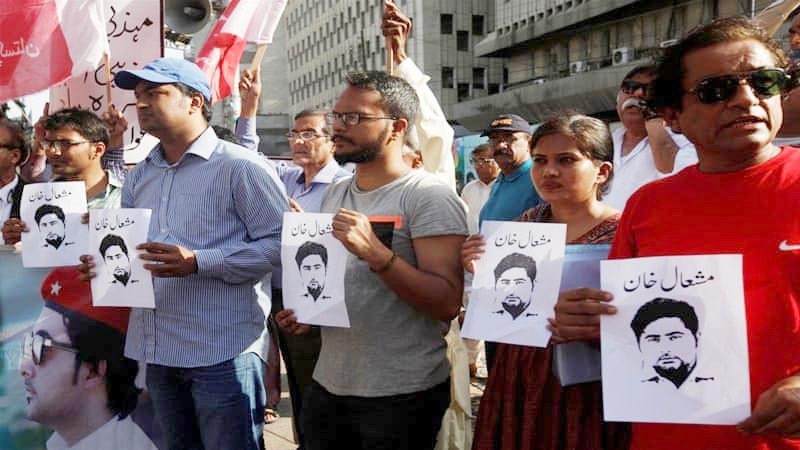
It is not hard to find mob mentality in online spaces

The mere charge of blasphemy in Pakistan is enough to make people see red. So it wasn’t surprising when various unconfirmed and inauthentic images, containing blasphemous content allegedly written by Mashal Khan were circulated right after his brutal murder. The initial commentary on those images was disturbing, but not unexpected. Praise and celebration for the mob who had lynched the young student to death and a call to continue waging this war against blasphemers dominated the pages where the doctored images were being shared. Within hours, the images had spread like wildfire. A significant number of social media users, commenting on these posts celebrated the violence, and called for more violence against anyone who dared support Khan.
Unfortunately, it is not hard to find people sharing this mentality.
"When it comes to the protection of religious beliefs, action by people is not vigilante justice, it is a religious duty," says Agha*, a university student from Karachi, who was calling for violence against those condemning Mashal Khan’s murder. "I don’t believe that the accusations were false. You cannot photoshop so many Facebook posts. Those supporting Mashal Khan are a part of a foreign agenda and you have to take the law in your own hand when your leaders have gone on the other side."
Agha* appears extremely frustrated by the sense that the authorities are failing to act. In 2014, people’s frustration with authorities’ failure to take immediate action had dire consequences, when a 600-strong mob set fire to homes and shops of the Ahmadiyya community in Gujranwala. The mob was triggered by a Facebook post deemed insulting to the religion that appeared on the timeline of an Ahmadi youth. The attack left an elderly woman and two children dead. The mob had mobilised after local police insisted that they file formal charges before any action could be taken.
While these are extreme cases, the use of social media to take or trigger action against behaviours perceived to be offensive, criminal or even unpleasant, is becoming more and more common.
Facebook pages and groups, and Twitter streams remain dedicated to ‘calling out’ and the naming and shaming culture. These call-outs range from the largely benign actions, like bad reviews, shared across platforms, to more sinister and targeted behaviour like doxxing, stalking, revealing identities and encouraging physical violence against perpetrators of perceived offences and crimes.
"If I see a post by a woman who has been harassed by someone, I use my technical skills to find out everything I can about the identity of that person. I find out his profiles, his friends’ and families’ profiles, and his workplace - everything I can. Once I have that information, then my group of friends gang up together to make sure that everyone in his circle knows exactly what kind of a person he is," says Abeera*, an IT graduate who is very active across social media platforms. "The trick isn’t just to make the posts viral. It is to make sure that it reaches the right people so that there is some consequence for the man."
She laughs when asked if she sees herself and her friends as vigilantes. "Not really," she says. "We aren’t punishing these men, just making sure they get a taste of their own medicine. If the ‘system’ were any better, we wouldn’t need to do this."
The sense that collective bashing on social media is a way to compensate for the shortcomings of the legal justice system appears to be rampant. A scroll through online city based groups, community groups and other collectives show a common trend - a user narrates a negative experience and those commenting encourage the same user to name and shame, to make the post ‘go viral’ and to contact whoever they perceive to have some authority over the offending party so that the perpetrator can be ‘taught a lesson’.
Also read: The weakening grasp of law
"I see a lot of such viral posts on my timeline. Most people asking you to spread the word about something bad that has happened to them do not actually file a legal complaint. I don’t blame them. After all no one gets justice in Pakistan through the actual legal system," says Hamza Ghani, a young entrepreneur. Ghani uses social media extensively. "By helping to make these posts viral and tagging the right people at least there is a chance that someone influential might see it and take action. When I share such posts and call for action, I’m not trying to be a vigilante, I am just trying to help people and shame those who deserve to be shamed."
The sense of doing good - helping someone, simply by clicking the share button and adding a zealous or a hateful comment - appears to be a strong motivator.
But even if most people assume that they are being good Samaritans by adding their voice to spread content about alleged criminal behaviour, they might unwittingly be spreading information that is not true.
"The level of digital media information literacy in Pakistan is extremely low. People don’t know how to differentiate between misinformation, mal information and facts. They just see something and share it without giving it much thought," says Asad Baig, a media development expert from Islamabad. "This is not just ignorant, this is dangerous behaviour as it could trigger actual physical violence or it might ruin lives and careers of people who aren’t really guilty of whatever they are being accused of."
*Names have been changed to protect the identity on request of the individuals
The writer is the co-founder of Media Matters for Democracy. She can be reached on Twitter @nuqsh